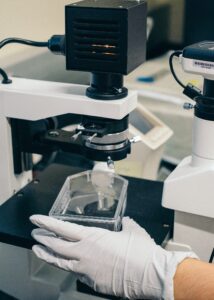
Researchers are advancing organoid research by using machine learning to develop personalised treatments for liver cancer, sparking ethical questions among experts.
Lead organoid researcher Dr Benjamin Dwyer and his team at Edith Cowan University (ECU) are creating “mini organs in a dish” from patient stem cells to mimic the structure and function of tissues.
“Their advantage is that they model tissue function and structure elements because they recreate three-dimensional interactions. Dr Dwyer said.
Artificial intelligence (AI) is used to analyse the organoids’ responses to different treatments, according to Dwyer.
“We take microscope images of the organoids and use artificial intelligence to train models to recognise different features of those cells. This can hopefully speed up drug development by picking out features of dying cells and potentially identifying ideal combinations of therapies,” Dr Dwyer said.
Associate Professor Garth Maker said the ethical implications of using patient-derived tissues for organoid research are complex.
“Historically, some of the most important cell lines in medical research, like the HeLa cells, were created largely without the knowledge or consent of the person they were taken from. Using patient-derived samples addresses a lot of those concerns, but it does create some of its own considerations, particularly when it comes to things like commercialisation,” Maker said.
According to Dr Dwyer, the goal is to create a bank of organoids developed from tumour cells, which have the potential to be immortal.
“At the moment, we’ve got over 20 different organoid lines from 20 different patients with different types of liver cancer. We screen thousands of drugs on these individual organoids to develop new treatments for liver cancer,” Dr Dwyer said.
“We’ve got organoids that we’ve been growing for over two years. Technically, they may be semi-indefinite, but some cells will reach a kind of end-of-life after they’ve been divided a certain number of times. But with tumour cells, one of their properties is that they keep dividing.”
According to Associate Professor Maker, most medical researchers act with the highest degree of ethics, but there is still a possibility for misuse.
“There’s always the possibility that samples could be used for purposes outside the consent provided by the patient… developments during the research process might mean the original consent no longer applies,” Maker said.
The potential for personalised healthcare is vast but medical researchers may lack the expertise to fully understand AI’s ethical implications, according to Maker.
“It’s important to reach out to AI experts to ensure that we handle patient data appropriately and ethically.”
Maker said the future of personalised medicine relies on the healthcare system undergoing significant changes.
“If we’re going to achieve personalised healthcare, we need to revolutionise our current healthcare system, which is effective for some people but not for others, particularly minority groups,” Maker said.
According to Maker, as AI-involved research grows, regulatory bodies and ethics committees must have the expertise to properly evaluate developments and proposals.
